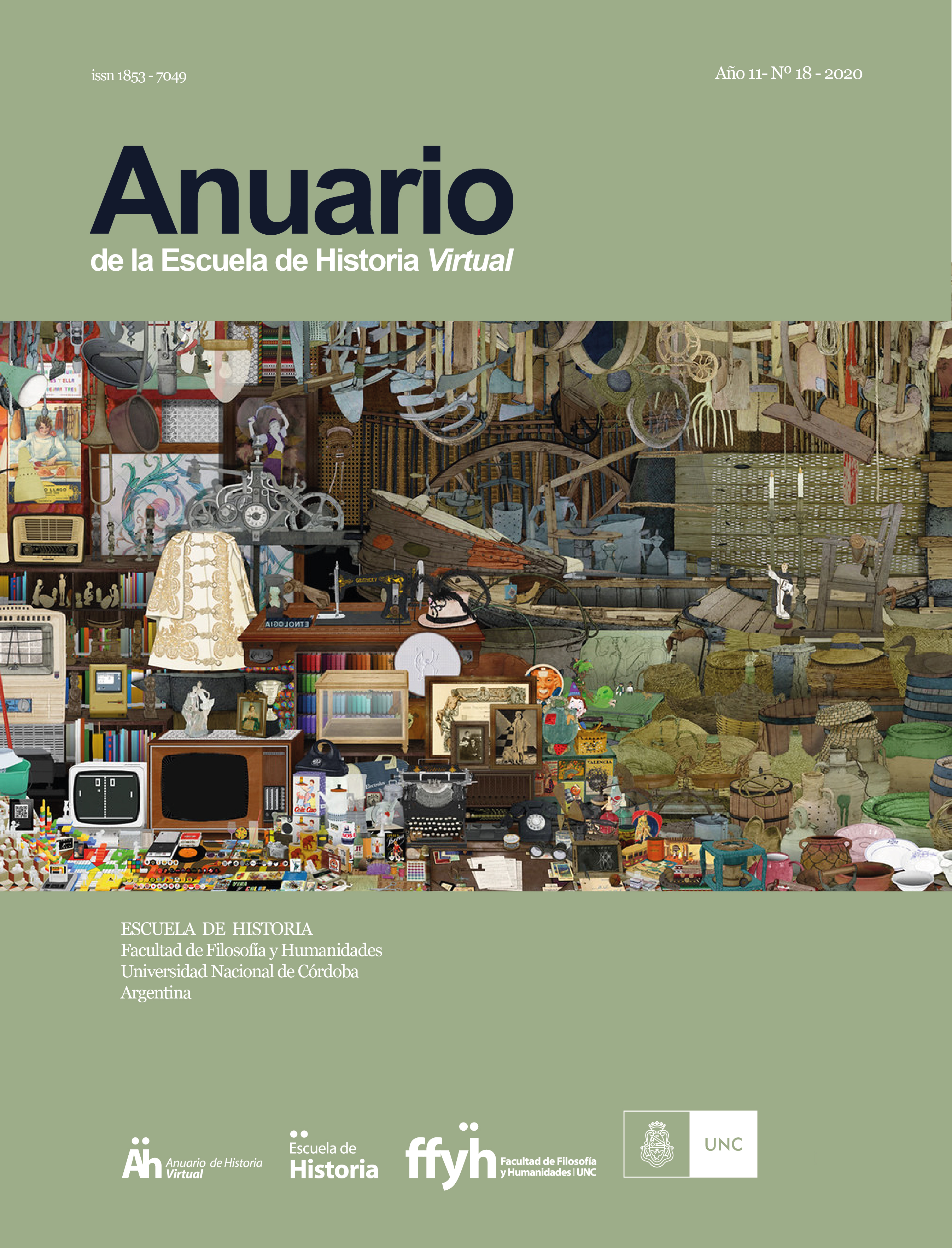Henry Hyndman y la evolución de su pensamiento con respecto a la India (1877-1919)
Contenido principal del artículo
Resumen
El presente trabajo aborda la trayectoria de Henry Hyndman, un político inglés de origen radical y Tory, que luego se convertiría al socialismo y fundaría la Social Democratic Federation (SDF), uno de los partidos socialistas británicos afiliados a la Segunda Internacional. En este estudio de caso se pretende dar cuenta de la evolución de sus posturas con respecto a la colonia británica de la India, las cuales son analizadas en el marco de su militancia y actividad política. Se propone un tipo de análisis que reconstruya su militancia y trayectoria política en el marco de un conjunto diverso de ideas sobre la India que circulaban en Gran Bretaña.
Detalles del artículo

Esta obra está bajo una licencia internacional Creative Commons Atribución-NoComercial-SinDerivadas 4.0.
Bajo los siguientes términos:
Atribución - Usted debe dar el crédito apropiado, proporcionar un enlace a la licencia e indicar si se hicieron cambios. Usted puede hacerlo de cualquier manera razonable, pero no de ninguna manera que sugiera que el licenciante lo respalda a usted o a su uso.
No comercial - Usted no puede utilizar el material con fines comerciales.
NoDerivados - Si remezclas, transformas o construyes sobre el material, no puedes distribuir el material modificado.
Referencias
Bayly, C. (2012). Recovering Liberties. Indian Thought in the Age of Liberalism and Empire. Cambridge: Cambridge University Press.
Bevir, M. (1991). H. M. Hyndman: a rereading and a reassessment. History of Political Thought, 12 (1), 125-145.
Bevir, M. (1992). The British Social Democratic Federation 1880-1885: From O´brienism to Marxism. International Review of Social History, 37, 207-229.
Claeys, G. (2010). Imperial Sceptics: British Critics of Empire. Cambridge: Cambridge University Press.
Crick, M. J. (1988). To make twelve o'clock at eleven. The history of the social-democratic federation (tesis de doctorado). Universidad de Huddersfield, Inglaterra. URL: http://eprints.hud.ac.uk/id/eprint/7152/ [Descarga 19/04/2020].
Davis, M. (2010). Late Victorian Holocausts. El Niño Famines and the Making of the Third World. Londres: Verso.
Etherington, N. (2009). Hyndman, the social-democratic federation, and imperialism. Historical Studies, 16 (62), 89-103.
Forbes, G. (2003). The English Positivists and India. En R. Kumar (Ed.), Essays on Indian Renaissance (pp. 150-164). Nueva Delhi: Discovering Publishing House.
Fromkin, D. (1980). The Great Game in Asia. Foreign Affairs, 58 (4), 936-951.
Harcourt, F. (1980). Disraeli’s Imperialism, 1866-1868: A Question of Timing. The Historical Journal, 23 (1), 87-109.
Hyndman, H. (1877). The Indian famine and the crisis in India. Londres: Edward Stanford.
Hyndman, H. (1878). The Bankruptcy of India (Part I). Nineteenth Century Magazine, octubre. URL: https://www.marxists.org/archive/hyndman/1878/10/bankruptcy-india-1.htm [Descarga 19/04/2020].
Hyndman, H. (1881). England for all. Londres: Messrs. Gilbert & Rivington.
Hyndman, H. (1886). The Bankruptcy of India. Londres: Swan Sonnenschein, Lowrey & Co.
Hyndman, H. (1904). Report to the International Socialist Congress. Colonies and dependencies. Report to the International Socialist Congress, held at Amsterdam, 14 de agosto. Twentieth Century Press.
URL: https://www.marxists.org/archive/hyndman/1904/08/colonies-dependencies.htm [Descarga 10/04/2020].
Hyndman, H. (1978 [1907]). Reports of the Social Democratic Federation, Ruin of India by British Rule. En G. Haupt (Ed.). Histoire de la IIe Internationale (pp. 513-533), vol. 16. Ginebra: Minkoff Reprint. URL: https://www.marxists.org/archive/hyndman/1907/ruin-india.htm
[Descarga 10/04/2020].
Hyndman, H. (1911). The record of an adventurous life. Nueva York: The Macmillan Company.
Hyndman, H. (1919). The emancipation of Asia. Nueva York: Boni and Liveright.
Koebner, R. y Schmidt, H. D. (1964). Imperialism. The Story and Significance of a Political Word, 1840-1960. Londres: Cambridge University Press.
Kumar, A. (1992). Marx and Engels on India. The Indian Journal of Political Science, 53 (4), 493-504.
Marx, K. (2010a [1853]). The British Rule in India. En J. Cohen (Ed.), Karl Marx, Friedrich Engels: Collected Works, vol. 12 (pp. 125-133). Londres: Lawrence & Wishart.
Marx, K. (2010b [1853]). The Future results of the British Rule in India. En J. Cohen (Ed.), Karl Marx, Friedrich Engels: Collected Works, vol. 12 (pp. 217-222). Londres: Lawrence & Wishart.
Marx, K. (2010 [1857]). British incomes in India. En J. Cohen (Ed.), Karl Marx, Friedrich Engels: Collected Works, vol. 15 (pp. 349-353). Londres: Lawrence & Wishart.
Marx, K. (2010 [1858]). Taxation in India. En J. Cohen (Ed.), Karl Marx, Friedrich Engels: Collected Works, vol. 15 (pp. 575-580). Londres: Lawrence & Wishart.
Metcalf, B. y Metcalf, T. (2006). A Concise History of Modern India. Nueva York: Cambridge University Press.
Misra, U. (1984). Nineteenth Century British Views of India: Crystallisation of Attitudes. Economic and Political Weekly, 19 (4), 14-21.
Morris, M. (2014). From anti-colonialism to anti-imperialism: the evolution of H. M. Hyndman’s critique of empire, c. 1875-1905. Historical Research, 87 (236), 293-314.
Owen, N. (2007). The British Left in India. Metropolitan anti-imperialism 1885-1947. Nueva York: Oxford University Press.
Roy, T. (2015). The British Empire and the Economic Development of India (1858-1947). Revista de Historia Económica, Journal of Iberian and Latin American Economic History,
34 (2), 209-236.
Singh, S. S. (2018). Echoes of Freedom: Radical Indian Thought and International Socialism, 1905-1920 (tesis de doctorado). Universidad de Chicago. URL: https://knowledge.uchicago.edu/record/206/files/Singh_uchicago_0330D_14193.pdf [Descarga 19/04/2020].
Sen, S. N. (1997). History of the freedom movement in India (1857-1947). Calcuta: New Age International.
Shanker, P. S. (2005). Henry Mayers Hyndman (1842-1921) and the radicalization of the Indian National Congress. Proceedings of the Indian History Congress, 66, 1041-1049.
Stokes, E. (1959). The English Utilitarians and India. Oxford: Claredon Press.
Taylor, M. (2007). Joseph Hume and the reformation of India, 1819-1833. En G. Burgess y M. Festenstein (Eds.), English Radicalism, 1550-1850. (pp. 285-308). Cambridge: Cambridge University Press.
Wilkins, M. S. (1959). The Non-socialist origins of England´s First Important Socialist Organization. International Review of Social History, 4 (2), 199-207.
Wolfe, W. (1975). From Radicalism to Socialism: Men and Ideas in the Formation of Fabian Socialist Doctrines, 1881-1889. Londres: Yale University Press.
Young, D. M. (2003). People, place and party: the social democratic federation 1884-1911 (tesis de doctorado). Universidad de Durham, Inglaterra. URL: http://etheses.dur.ac.uk/3081/ [Descarga 12/03/2020].
